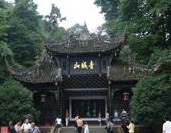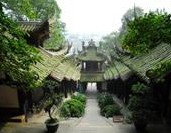
Mount Qingcheng Guide
-Travel to Mount Qingcheng Located east to Chengdu and Dujiangyan with a distance of 68 kilometers, Mount Qingcheng dominates the Chengdu plain. It is one of the most famous Taoist holy lands in China and listed together with the neighboring Dujiangyan as the World Heritage site. Mount Qingcheng abounds with historic sites and cultural relics as well as natural beauties. Covering 200 square kilometers, the scenic area of the mountain includes Mingjiang River, several peaks, with Laoxiao Ding Peak being the highest at 1260 meters above sea level, woods and several temples. The peaks stand in such position that resemble a natural city wall.
Located east to Chengdu and Dujiangyan with a distance of 68 kilometers, Mount Qingcheng dominates the Chengdu plain. It is one of the most famous Taoist holy lands in China and listed together with the neighboring Dujiangyan as the World Heritage site. Mount Qingcheng abounds with historic sites and cultural relics as well as natural beauties. Covering 200 square kilometers, the scenic area of the mountain includes Mingjiang River, several peaks, with Laoxiao Ding Peak being the highest at 1260 meters above sea level, woods and several temples. The peaks stand in such position that resemble a natural city wall.
 Mount Qingcheng is long known throughout China for its “secluded elegance”, which means that it enjoys most tranquil beauty among the famous mountains in China. Steps into the temple gate find out the elegance and serenity of all the things, no matter it is natural beauties or historical sites. Temples and pavilions, which are made up of natural materials like bamboos, canes, barks, and roots without any artificial ornaments, half hidden in luxuriant greens, give the showing of a harmonious picture integrating the surrounding hills, rocks, and springs.
Mount Qingcheng is long known throughout China for its “secluded elegance”, which means that it enjoys most tranquil beauty among the famous mountains in China. Steps into the temple gate find out the elegance and serenity of all the things, no matter it is natural beauties or historical sites. Temples and pavilions, which are made up of natural materials like bamboos, canes, barks, and roots without any artificial ornaments, half hidden in luxuriant greens, give the showing of a harmonious picture integrating the surrounding hills, rocks, and springs.
 Mount Qingcheng witnesses the birth of Chinese Taoism. It’s recorded that Zhang Daoling founded the doctrine of Taoism here in the late Eastern Han Dynasty and the teachings of Taoism have been disseminated widely throughout China since then. Zhang Daoling dispatched his disciples into 24 parishes, which they called Dongtian or Celestial Cave, and took Mount Qingcheng as the headquarters according to a legend. Of all the architectures in the mountain, Celestial Cave of Tianshi(the name given to the spiritual leader of the Taoist religion) and the Hall of Patriarchs are listed as the national key Taoist sites. Thanks to the existence and development of Taoism in Mount Qingcheng in the last 2000 years, especially the mastery and management by the accomplished Taoist priests of past dynasties, the mountain is fully preserved as the ancestral mountain in Taoists’ mind as well as a holy mountain in the secular people’s eyes. The ancient architectures, ruins, as well as historical stories and customs, even the trees, flowers, grasses in the mountain, are all imbued with the influence of the Taoist culture.
Mount Qingcheng witnesses the birth of Chinese Taoism. It’s recorded that Zhang Daoling founded the doctrine of Taoism here in the late Eastern Han Dynasty and the teachings of Taoism have been disseminated widely throughout China since then. Zhang Daoling dispatched his disciples into 24 parishes, which they called Dongtian or Celestial Cave, and took Mount Qingcheng as the headquarters according to a legend. Of all the architectures in the mountain, Celestial Cave of Tianshi(the name given to the spiritual leader of the Taoist religion) and the Hall of Patriarchs are listed as the national key Taoist sites. Thanks to the existence and development of Taoism in Mount Qingcheng in the last 2000 years, especially the mastery and management by the accomplished Taoist priests of past dynasties, the mountain is fully preserved as the ancestral mountain in Taoists’ mind as well as a holy mountain in the secular people’s eyes. The ancient architectures, ruins, as well as historical stories and customs, even the trees, flowers, grasses in the mountain, are all imbued with the influence of the Taoist culture.
More Attractions in Chengdu
- The Temple of Marquis Wu
- Du Fu Thatched Cottage
- Panda Zoo
- Mt.Emei
- Wangjiang Tower Park
- Sanxingdui Museum
- Wolong Panda Reserves
- Leshan Giant Buddha
- Ya'an Panda Reserve Base
- Zigong Dinosaur Museum
- Zigong Salt History Museum
- Chengdu Reaearch Base of Giant Panda Breeding
- Jinli Ancient Street
- Huanglongxi Ancient Town
- Chunxi Road Walk Street
- Mount Qingcheng
- The Dujiangyan Dam
- Kuan Zhai Alleys
- Xiling Snow Mountain
- Pingle Ancient Town
- Sichuan Provincial Museum
Your Question & Quick Answer*We welcome and appreciate your questions & reviews
Booking Procedures | Terms & Conditions | Payment Methods | Links | Site Map | About Us | Contact Us | Travel Agent
Copyright 2008, All rights reserved.. itourbeijing.com professional china travel guide and china travel service
TEL: 86-10-85711972 (Universal) 1-888-288-9328 (North America) E-mail: contact@itourbeijng.com
Tours Index | China Tours | Beijing Tours | Xi'an Tours | Shanghai Tours | Guilin Tours | Tibet Tours
China Travel | Beijing Travel | Shanghai Travel | Xi'an Travel | Guilin Travel |Beijing Map
China Golf | Beijing Golf | Shanghai Golf | Xiamen Golf | The Great Wall Travel | Yangtze Cruise | Travel Picture



